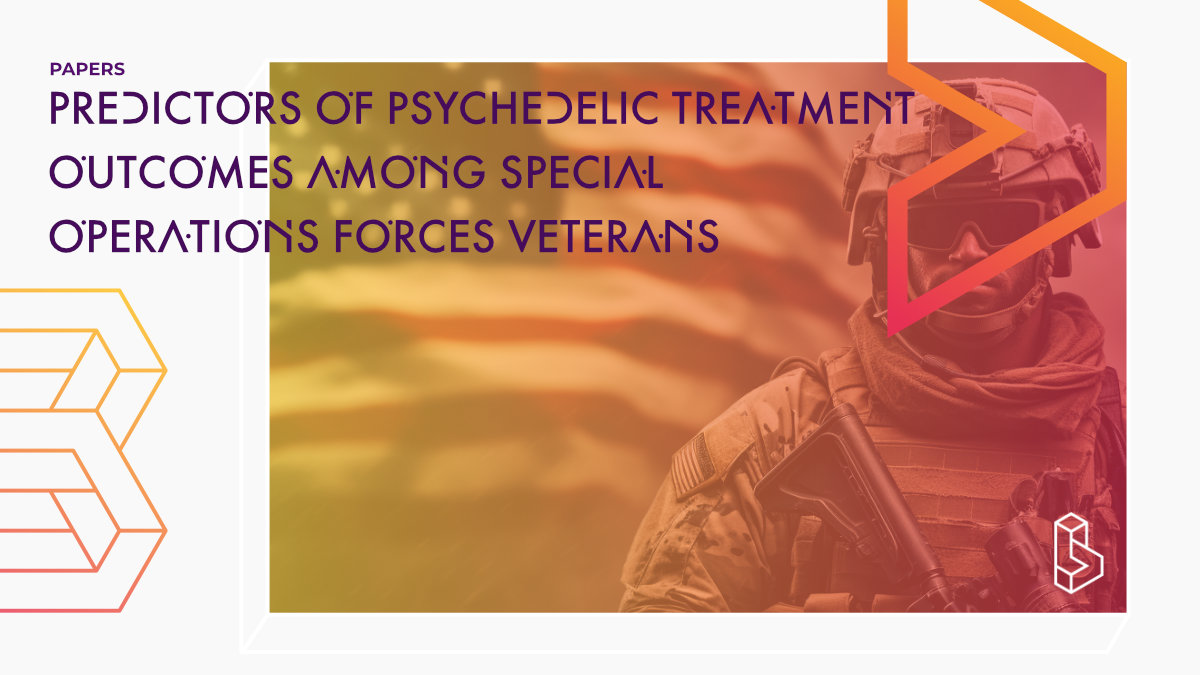This prospective study (n=86) examined the effects of ibogaine and 5-MeO-DMT treatment on U.S. Special Operations Forces Veterans with trauma exposure. Younger age and higher baseline levels of depression and anxiety were correlated with significant improvements in mental and psychosocial outcomes from baseline to 1-month follow-up. Greater intensity of changes in consciousness was linked to improved long-term mental health and psychosocial outcomes up to 6 months post-treatment. Increases in psychological flexibility within the first month mediated the relationship between changes in consciousness and reductions in trauma, depression, and anxiety symptoms.
Abstract of Predictors of psychedelic treatment outcomes among special operations forces veterans
“A prior study demonstrated that psychedelic-assisted therapy was related to reductions in mental health symptoms and associated consequences among U.S. Special Operations Forces Veterans seeking treatment in Mexico. The present study extends this analysis to explore the prospective associations of baseline predictors on treatment outcomes and whether changes in psychological flexibility mediate the relationship between acute changes in consciousness and clinical outcomes. Data were prospectively collected in an ibogaine-and-5-methoxy-N,N-dimethyltryptamine treatment program at pretreatment, 1-, 3-, and 6-month follow-up during September 2019–March 2021 among Special Operations Forces Veterans with a history of trauma exposure (N = 86; Mage = 42.9; Caucasian = 87.2%; male = 100%). Findings showed younger age and higher levels of depression and anxiety at baseline were correlated with greater improvements in satisfaction with life, cognitive functioning, psychological flexibility, trauma symptoms, and acute effects on personal meaningfulness and spiritual significance from baseline to 1-month follow-up. Additionally, greater intensity of changes in consciousness (e.g., personal meaningfulness, spiritual significance, psychological insightfulness) was correlated with greater improvements in long-term mental health outcomes (e.g., cognitive functioning, trauma symptoms) and psychosocial outcomes (e.g., social relationships, attitudes about life, behavioral changes, spirituality) from baseline to 6-month follow-up. Furthermore, increases in psychological flexibility from baseline to 1-month follow-up mediated the relationship between the greater intensity of changes in consciousness and greater decreases in trauma, depression, and anxiety symptoms at 1-month follow-up. Findings suggest that acute effects of the combined ibogaine-and-5-methoxy-N,N-dimethyltryptamine treatment experience, and improvements in psychological flexibility are critical factors associated with positive outcomes, as are younger age and greater symptom severity before treatment.“
Authors: Yitong Xin, Stacey B. Armstrong, Lynnette A. Averill, Nathan Sepeda, & Alan K. Davis
Summary of Predictors of psychedelic treatment outcomes among special operations forces veterans
There is a mental health crisis among military Veterans, including Special Operations Forces Veterans, who experience many deployments and intense combat situations. These factors increase the risk for a variety of mental health disorders.
The complex nature of problems in this population makes current treatments lacking. Furthermore, the two U.S. Food and Drug Administration-approved medications for treating PTSD have a delayed onset of weeks, which may put Veterans at greater risk of stress- and trauma-related concerns and engaging in risky behaviours.
Find this paper
Predictors of psychedelic treatment outcomes among special operations forces veterans
https://psycnet.apa.org/doi/10.1037/cns0000374
Paywall | Google Scholar | Backup | 🕊
Cite this paper (APA)
Xin, Y., Armstrong, S. B., Averill, L. A., Sepeda, N., & Davis, A. K. (2023). Predictors of psychedelic treatment outcomes among special operations forces veterans. Psychology of Consciousness: Theory, Research, and Practice.

